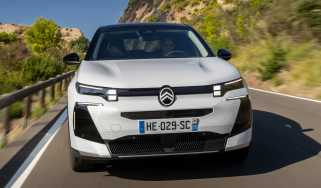Lexus RX 450h
Can the revised hybrid reach the top of luxury SUV tree?
The changes to the Lexus aren’t exactly revolutionary, but that’s no bad thing, as the existing car’s strengths remain. The hybrid engine is smooth and strong, and beats the diesels at their own game when it comes to efficiency. More practicality and an uprated cabin could have sealed the win.
Lexus has never been afraid to go its own way. While its upmarket European rivals have favoured traditional diesel engines for their big SUVs, the ambitious Japanese brand has pioneered hi-tech hybrid power. The hybrid RX made its debut in 2006, but it was the second-generation RX 450h that had the biggest impact, beating the excellent BMW X5 in a closely fought road test encounter in 2009.
However, you don’t stay ahead of the competition by standing still, so just three years after its launch the large Lexus has gone under the knife. And it’s been given the ammunition to continue its winning ways, including revised looks, an updated interior and a number of chassis tweaks. Glance at the Lexus and you’re likely to miss the updates.
At the front there’s a new grille and headlamp layout that takes its cues from the CT 200h hatch and new GS saloon, while moving around to the rear reveals the new tail-light design. Otherwise, the RX looks just like its predecessor – although our F Sport version benefited from a little extra kerb appeal courtesy of its gunmetal grey 19-inch alloys and deeper front bumper.
Used - available now
Climb aboard and it’s clear that an equally subtle approach has been taken inside. The major updates include a new multifunction steering wheel and an improved, computer mouse-style controller for the Remote Touch infotainment and sat-nav system. The rest of the cabin has been carried over largely unaltered from the old car, which means you get top-notch build and high-quality materials, but a slightly dated design.
Still, there’s no complaining about the kit count. Soft leather trim, heated and keyless entry are all standard – add these items to the Mercedes and you’ll pay £2,360. Space isn’t in short supply, either. Occupants in the back get enough room to stretch out, while the driver benefits from a wide range of seat and steering wheel adjustment, plus a commanding view of the road.
It’s only when it comes to carrying luggage that the Lexus struggles, as its 446-litre boot is 194 litres smaller than the Mercedes’. On the plus side, a powered tailgate takes the strain out of loading when your hands are full of shopping.
On the move, the Lexus’ refinement impresses most. Up to 25mph, the hybrid powerplant can run in near-silent electric mode, and even when the 3.5-litre V6 cuts in it’s more subdued than the diesels of the M-Class and Touareg.
The cabin is also well insulated from road and wind noise. The RX 450h is remarkably quick, too. It needed only 7.9 seconds to complete the 0-60mph sprint, which was just six-tenths slower than the muscular VW. Yet away from the track this performance is disguised by the standard CVT gearbox, which doesn’t feel as responsive as the traditional automatic transmissions used by its rivals.
Turn into a corner and the Lexus feels composed. The steering is direct, there’s decent grip and body movement is kept well in check. This is partly down to the stiffer suspension of our F Sport model, plus Lexus’ lateral damper unit, which aims to improve stability and sharpen responses. Select Sport mode – there are also EV, Eco and Snow settings – and you get keener throttle response and weightier steering.
Unlike its rivals, however, the Lexus doesn’t have a permanent four-wheel-drive set-up. Instead, the rear axle is powered by a separate electric motor, which kicks in when extra acceleration or traction are needed. As a result, the essentially front-wheel-drive RX 450h suffers from torque steer when accelerating hard on bumpy roads.
Slow down a little and you’ll discover the car rides well, while the light controls and decent visibility make it easy to drive. At £51,995, the well equipped Lexus is the most expensive car here – although an SE model is available for £44,495. However, low 145g/km CO2 emissions make it a greatvalue company car choice, while we managed an excellent 31.1mpg at the pumps. Will that be enough to keep the RX on top?







